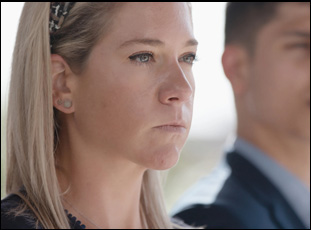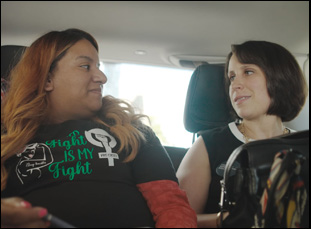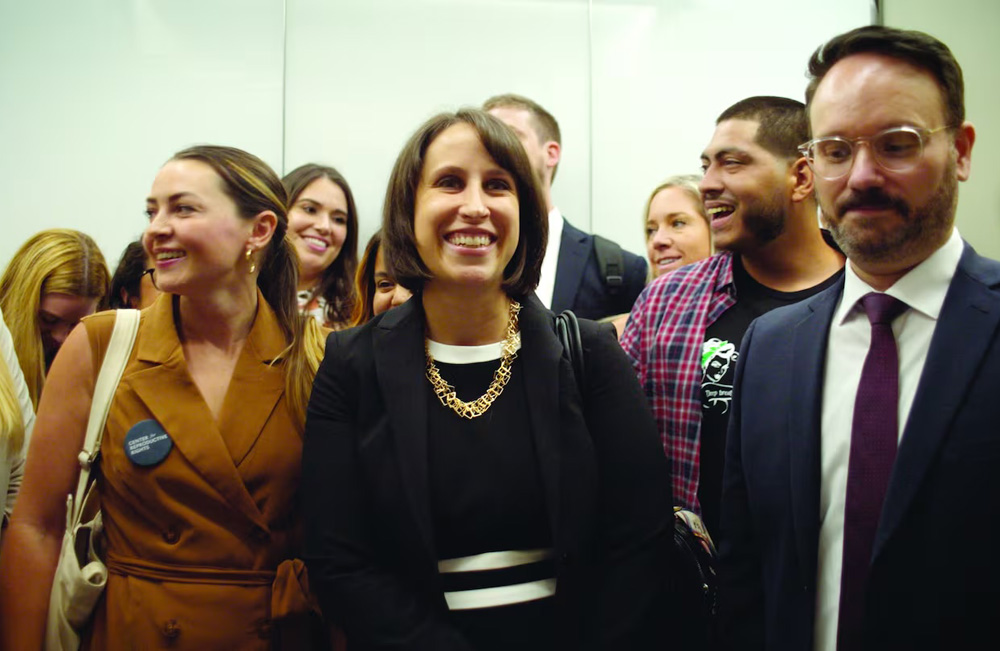After growing up in Corpus Christi, Maisie Crow had moved to New York to pursue a career in photojournalism, surely thinking as many before her have that it was where she could tell stories of the greatest scope when it is the cultural capital for so many industries. Yet in 2016, she was drawn back to Texas when she and her husband wanted to tackle the ever-present and precarious issue of life along the U.S./Mexico border and unexpectedly the two ended up inheriting a weekly newspaper The Big Bend Sentinel, where she would become friends and collaborators with one of its reporters Abbie Perrault. For those on the outside looking in, this could’ve looked like Crow was downsizing her ambitions, but when her home state has become a bellwether for so much going on in America, it now appears like she couldn’t have found any bigger stories to tell and the country itself couldn’t have found someone better to tell those stories.
“Abbie and I both have very close family members who are very conservative, and living in Texas, I’m certainly used to interacting with people on both sides of the aisle,” said Crow. “One of the most important things that I feel like I can do in my work is take the issues that seem to be dividing our country and try to focus on the lived human experience, bringing people from wherever they are on the political spectrum into the same story to experience the same thing and then with that information, allow them to draw their own conclusions. I don’t want to take any issue and try and beat someone over the head with it. I think the most important way to educate and make change is to share the stories of those who are affected by certain laws in the country.”
Not long after meeting at the Sentinel, Crow and Perrault made “At the Ready,” a fascinating peek at the Border Challenge in Texas where high school students play-acted scenarios from active shooter drills to prepare them for such an incident to happen on their campus to drug raids where they’d be holding the (fake) guns, aimed at potentially pursing a career in law enforcement when those jobs are considered one of the only steady forms of employment in the area. Their follow-up “Zurwaski V. Texas” is equally compelling and potentially more urgent when it involves the court case brought by the Center for Reproductive Rights on behalf of Amanda Zurawski, an Austinite who couldn’t legally obtain an abortion in Texas after the Supreme Court’s ruling in Dobbs v. Jackson after being told 18 weeks into her pregnancy that her fetus would survive and carrying it to term would likely imperil her chances of ever giving birth.
If anyone was to know what to expect after abortion access was eliminated in states such as Texas when the Dobbs decision was handed down in 2022, it was Crow, having made her first documentary “Jackson” about the Mississippi-based clinic that was at the heart of the Supreme Court decision, but what the filmmaker also knew was that given the independent streak that so many Texas women take pride in, the matter wasn’t going to be settled without a fight. It’s why in spite of the devastating story that’s at the center of “Zurawski V. Texas,” where other women from various walks of life including Samantha Casiano, and Dr. Austin Dennard join Zurawski’s suit to share their own life-threatening experiences when forced into keeping their pregnancies, it is a galvanizing call to action when the battle takes two fronts as lawyer Molly Duane makes a passionate argument in legal chambers ranging from Travis County Courthouse in Austin all the way to the Texas Supreme Court and an appeal to the court of public opinion draws out more women to talk about the unnecessarily cruel laws on the books.
That momentum has only kept going after production wrapped on the film as it accrued a producing team that includes former Secretary of State Hillary Clinton, Chelsea Clinton and Jennifer Lawrence, amongst others, and has barnstormed the country since its premiere at Telluride in late August, making waves at regional film festivals before the upcoming presidential election. The film will be released widely this week in a truly unique fashion when traditional theatrical runs at the Angelika in New York and the Monica Film Center in Los Angeles, as well as special screenings at AFI Fest in L.A., the Philadelphia Film Festival, the Chicago Film Festival and the Montclair Film Fest this weekend will be accompanied by a free virtual screening for people not around those areas, and in the midst of a whirlwind fall, Crow spoke about supporting access for all in many different respects with “Zurawski V. Texas,” keeping the focus limited to show the broad implications of the case and the demands of a story that never stopped.
 From what I understand, this wasn’t the original plan to necessarily follow this case, but there’s been a longstanding interest in this subject matter since Jackson, and I wondered how this all came about.
From what I understand, this wasn’t the original plan to necessarily follow this case, but there’s been a longstanding interest in this subject matter since Jackson, and I wondered how this all came about.
When the Supreme Court heard the arguments in Dobbs Vs. the Jackson Women’s Health Organization, it was very, very clear through those oral arguments to myself and my co-director, Abbie Perrault that Roe was likely going to get overturned, so we started planning at that point to make a film about post-Roe America. But we had no clue what that would look like or would entail. It seems so obvious now, but looking back to that moment, I had just given birth to my first child and it was a very raw time for me. Both myself and [Abbie] are Texas women and it was very scary to be a woman in Texas at that point in time.
We were in Mississippi for the overturning of Roe, embedded in Jackson Women’s Health Organization when they got the news that they would have to shut down and that they lost the case and Roe had been overturned. It was a very, very difficult day and watching over the course of the next several months what happened across the country in states where abortion was then banned was devastating. We heard many, many stories. We spoke with many women. We traveled out of state with one woman to receive abortion care in a state where it was still legal. And during all of this, we were in touch with the Center for Reproductive Rights and understood that Molly was researching and preparing a lawsuit. After we had this information, we quickly realized [“Zurawaski Vs. Texas”] was going to be the story we needed to tell, [where] we could both show the devastation, but also provide some form of hope because it was one of the first times that we had seen a fight back against what was happening. We met Amanda shortly after we started filming with Molly, and it was clear these women are stepping up. They’re not going to be silenced. and they’re sharing their stories to make sure other women aren’t put in the same situation they were in.
It must be interesting to move from imagining this as some larger-scale national project and realizing you could really tell a story from following four subjects and one court case. Was keeping the focus limited something you had to negotiate?
There’s a lot of great stories and great work that do survey the entire landscape, but I like to go very deep on a subject matter or an individual story. Abbie and I are very, very interested in embedding ourselves with the participants that we’re following and I say participants here because the women in this film wanted their stories told. They were very involved in the process of sharing their stories and were constantly making sure that we knew when something was happening or when decisions were coming down so that we could get those moments, which is the only reason we were able to make this film so quickly because they were such amazing collaborators on sharing the story.
One of the moments that really stuck with me was when Amanda is asked if she’s actually declined any media requests for an interview when her experience is clearly difficult for her to talk about and she says no because every time she talks, she hears back from at least one new person that her story’s been able to touch. Was that actually something that gave you some strength when I imagine the process could be futile?
Sure, because it’s really important. That was early on in Amanda’s journey through all of this and she was really starting to constantly get scheduled for interviews, going on TV, talking to reporters. It’s been over a year since we filmed that moment, and she continues to say yes to everything and after every screening, people line up and say, “This happened to me. I experienced the same thing you experienced, but Roe was the law of the land, and so I was safe and I was able to get healthcare.“ And that is what is so incredible about each of these plaintiffs is that they signed their name to this because they wanted to make sure that it didn’t happen to anyone else. They wanted to make sure that people also understand what is happening in abortion ban states and they are going to keep talking about it until something changes.
 Besides Amanda, how did you decide which other plaintiffs to focus on?
Besides Amanda, how did you decide which other plaintiffs to focus on?
When we started filming, Molly was pretty deep into her strategy and knew who would be testifying, so we were able to focus in on them. We actually had met Samantha shortly before she joined the lawsuit, sadly the night before her daughter’s funeral, and we talked many times that evening about, was she comfortable with us filming this? And without fail, each time we brought it up, she very clearly said, “Look, the rest of the world needs to know what I’m dealing with. This is something that should not have happened, and I need people to know so that other women do not go through this.” With all of the plaintiffs, their reason for coming forward and putting their names on a lawsuit and taking the stand is because they don’t want other women and families to go through what they’ve gone through, so it was both a bit of planning, understanding who was going to take the stand and who was really wanting to be open and share their story and I think there’s so much power in them fighting for the rights of others.
Was there anything that happened that changed your ideas of what this could be?
I always approach filmmaking, especially verite filmmaking in the way where I’m open to wherever the journey takes me and I don’t think we had any idea that [the case] was going to be appealed to the Supreme Court as quickly as it was. When we started filming, we thought the court hearing where you see the plaintiffs testify was going to be the only court hearing that we had in the film. Then obviously we end up with the Texas Supreme Court hearing and at the last minute, this emergency appeal is filed on behalf of Kate Cox and her husband. We could never have anticipated that, and when Molly says in the film, “While I was in court, another patient called,” I remember getting that phone call from Molly that they were going to be filing an emergency lawsuit and we had just gotten home from filming and literally had not unpacked our bags. We just turned around and headed back to the airport.
Usually films can’t respond to what’s going on that quickly because of how long to take to make, but this seems to be an exception not only in how it was produced, but now being distributed where you really took the festival circuit by storm in the past month and have a national release. How’d you figure out how this could get out into the world?
We have an incredible team of people behind this film from our producers at Storyforce and Hidden Light to our executive producers Secretary [Hillary] Clinton, Chelsea Clinton, and Jennifer Lawrence and our individual funders. We also had an amazing editing team and everyone was working towards the same goal of making sure we got this out in time to really to educate the public on what’s happening because it’s one thing to read these stories, but it’s a whole other to watch the film and experience what each of our participants is going through on a daily basis.
And every screening has been filled and we’re having incredible conversations afterwards. We’ve been really honored that at most of the screenings, one, if not all of the participants in the film have been able to join us and time and time again, I hear from people who went into the screening thinking they knew what they were going to see and how these stories played out, but they left being very moved by the plaintiffs and also really surprised at how the long-term traumatic effects of being denied healthcare affect each one of the individuals in the film, both emotionally and physically. I don’t think that people expect to see that and want to do something and make sure that their friends also see the film and that people understand.
“Zurawski V. Texas” opens on October 25th in Los Angeles at the Monica Film Center and New York at the Angelika Film Center. It will also play at the Philadelphia Film Festival on October 25th and 27th, the Chicago Film Festival on October 26th and 27th and the GlobeDocs Festival in Boston on October 27th. A full list of theaters and dates is here. The film will also be available to watch for free virtually on the weekend of October 26th.




